Overview
Understanding free and clear title is paramount for real estate professionals, as it guarantees that a property is devoid of liens, encumbrances, and legal claims. This assurance facilitates seamless transactions and safeguards buyers' interests. Furthermore, the article underscores the necessity of verifying a clear title through comprehensive ownership searches and the integration of advanced technologies such as AI. This approach is essential to mitigate potential disputes and avert financial losses during property transactions.
Introduction
In the intricate world of real estate, the concept of a free and clear title serves as a cornerstone of successful property transactions. This designation signifies that a property is devoid of any liens or legal claims, assuring buyers of their complete ownership rights and fostering confidence in their investments.
As the real estate landscape evolves, understanding the nuances of title clarity becomes increasingly vital for both buyers and professionals alike. Furthermore, statistics reveal that a substantial number of transactions are influenced by title issues, underscoring the critical importance of securing a clear title.
From the role of advanced technology in title verification to essential practices for maintaining clear titles, this article delves into the critical components that ensure smooth and successful real estate dealings.
Defining Free and Clear Title: What It Means for Real Estate
A free and clear title signifies that a real estate asset is devoid of any liens, encumbrances, or legal claims that could jeopardize possession. This status ensures that the owner possesses complete rights to the asset, free from any outstanding debts or obligations. In the domain of property, obtaining an unencumbered ownership document is essential for enabling smooth transactions, permitting purchasers to invest with assurance, aware that there are no concealed claims that might emerge later.
Understanding the current landscape, statistics indicate that a significant percentage of assets hold free and clear ownership, which is vital for real estate professionals to consider. For example, in Nevada, the home ownership rate is at 62.5%, emphasizing the significance of clear ownership documents in preserving property value and enabling sales.
Moreover, understanding home equity is crucial for homeowners, as it directly affects potential sales proceeds and borrowing options for expenses like home repairs. This understanding strengthens the importance of having free and clear title ownership documents, as they contribute to a homeowner's equity and financial flexibility.
Expert opinions emphasize that confirming a document's status is a fundamental step before any sale or transfer of ownership. This verification process not only protects the interests of buyers but also enhances the overall success rates of real estate transactions. Properties with unencumbered ownership tend to experience smoother closings and fewer disputes, making them more appealing to potential buyers.
In this context, Parse AI's advanced machine learning tools for document processing and research automation play a pivotal role. By leveraging these tools, researchers can efficiently extract critical information from documents, ensuring accurate verification of status. This capability not only streamlines the research process but also supports the integrity of land rights acquisition.
Case studies demonstrate the effect of unrestricted and clear ownership on transaction success. For instance, property agents who emphasize lead generation tactics frequently discover that assets with transparent ownership are more attractive to clients, resulting in faster sales and increased satisfaction levels. As almost half of real estate experts use email as a main approach for nurturing leads, grasping the nuances of status can significantly affect their outreach and marketing strategies.
As Jay Hinrichs noted, "2k is super cheap to do this," emphasizing the cost-effectiveness of verifying ownership status in the long run.
In summary, the significance of having a free and clear title cannot be overstated. It not only protects asset ownership but also plays a crucial role in the effectiveness and success of transactions in the market, backed by innovative solutions like those provided by Parse AI.
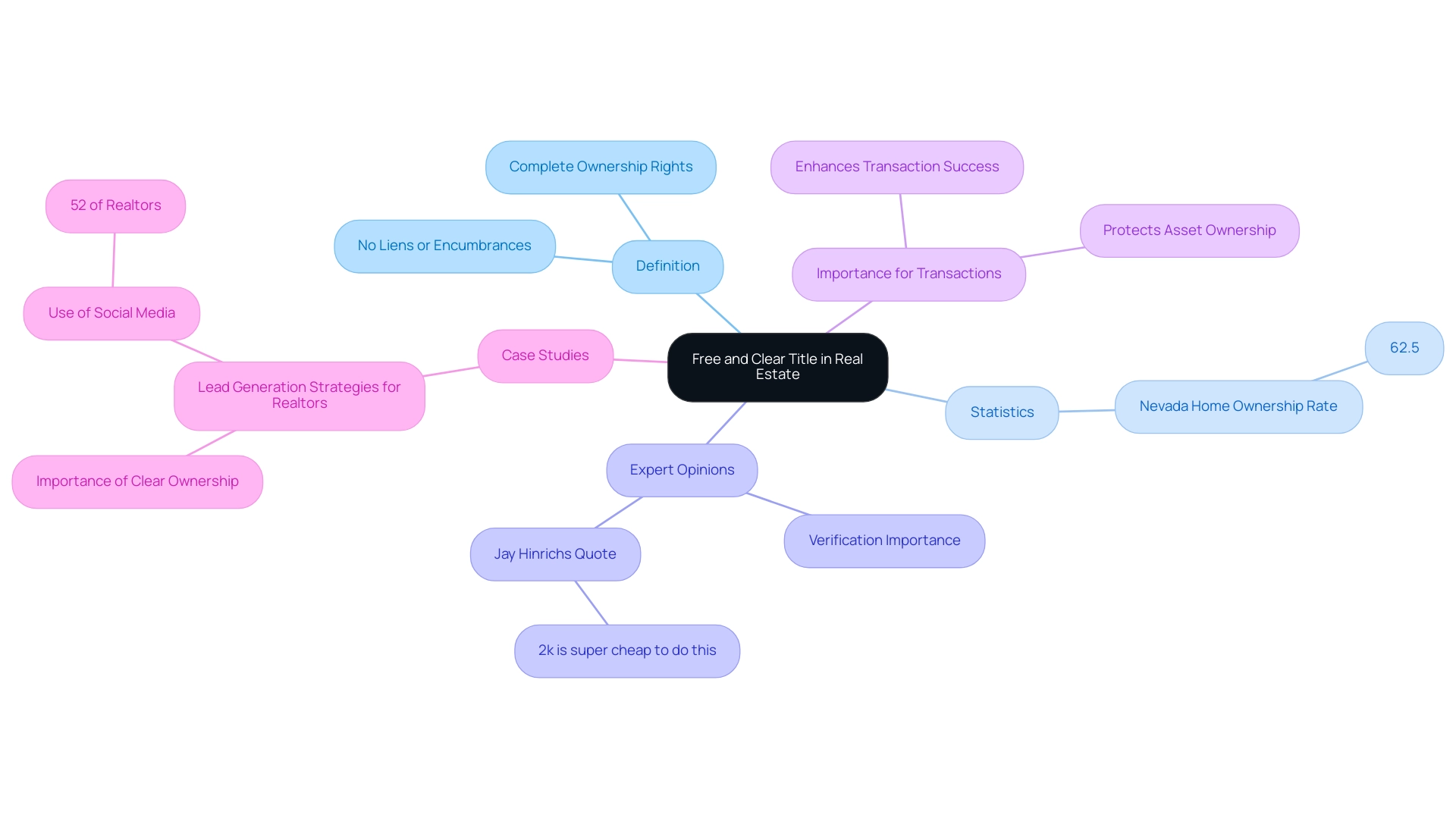
Distinguishing Between Clean and Clear Titles: Key Differences
The terms 'clean' and 'clear' are frequently used interchangeably in real estate discussions; however, they convey different meanings that are crucial for professionals in the field. An unblemished document indicates that the asset is devoid of any legal concerns or disputes, implying a clear ownership history. In contrast, a clear designation specifically indicates that there are no liens or encumbrances on the property, thereby ensuring that the owner holds a free and clear title to the asset.
For instance, a property might possess a clean designation but still harbor unresolved matters that could impact ownership, such as ongoing litigation or disputes. This distinction is vital, as misunderstandings can lead to significant complications during transactions. Statistics reveal that a notable percentage of real estate transactions—approximately 25%—are affected by ownership issues, underscoring the importance of thorough ownership searches.
Furthermore, for a residence valued at $400,000, selling without a representative could result in a loss of $120,000, emphasizing the financial consequences of ownership problems and the necessity of performing thorough ownership examinations.
Case studies demonstrate the practical ramifications of these definitions. Ownership searches meticulously trace the history of a property’s ownership, confirming that the seller has the legal right to sell. This process entails examining public records to confirm the chain of ownership and reveal possible issues such as liens or unpaid mortgages.
The case study titled 'Title Searches Confirm Ownership' emphasizes how these searches help buyers avoid hidden claims or disputes, ultimately preventing costly surprises after the purchase is complete. Additionally, thorough property searches ensure a seamless closing process by identifying issues that could delay or derail transactions, providing peace of mind to buyers.
Real estate experts emphasize the necessity of understanding these nuances. Jamie Keeton, a Title Representative from Fort Lauderdale, Florida, notes, 'In this case, there is no 'foreclosure' process and therefore nothing gets cleared.' This viewpoint emphasizes the complexities surrounding ownership issues.
An unblemished document may offer a sense of safety, but only a transparent certificate guarantees that the asset has a free and clear title, ensuring it is free from financial claims. Therefore, realty experts must be skilled at differentiating between the two to effectively assist their clients through the intricacies of transaction processes.
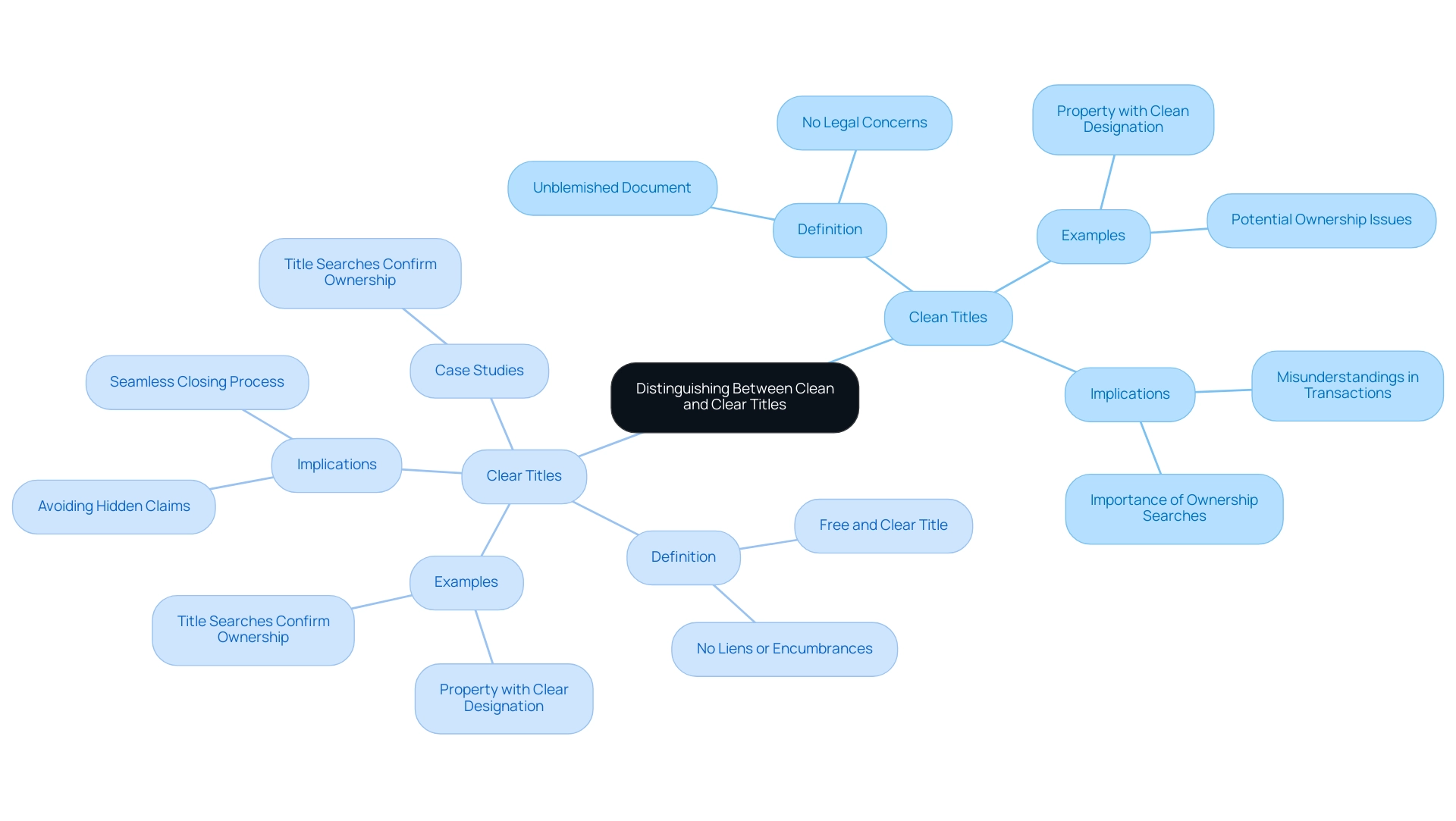
The Importance of a Clear Title in Real Estate Transactions
A distinct label is crucial in property dealings, as it verifies that the seller holds the lawful right to sell the asset and that the purchaser will obtain a free and clear title, unencumbered by any hidden claims. The absence of a clear designation can lead to considerable repercussions, such as disputes, delays in closing, and potential financial losses for both parties involved. For instance, unresolved liens or ownership disputes can complicate transactions, resulting in costly legal battles and extended timelines.
Real estate experts play a pivotal role in ensuring that all ownership issues are addressed prior to finalizing any transaction. This diligence not only protects their clients' interests but also upholds the integrity of the sale process. Statistics indicate that policy insurers face higher upfront costs compared to other insurers, despite paying fewer claims overall.
This underscores the significance of comprehensive ownership research and the financial consequences of ambiguous documents, which can result in disputes costing an average of thousands of dollars. Notably, Fidelity National Financial and First American Title Insurance Co. consented to pay $22.7 million to consumers in settlement agreements over alleged rebate activities, emphasizing the financial stakes involved in property insurance.
Furthermore, recent trends indicate that some investors may opt to bypass conveyancing companies to save on expenses, a decision that carries substantial risks. The potential for unresolved claims can jeopardize investments and lead to significant financial repercussions. Insights from industry specialists, like Mark Fleming, Ph.D., Chief Economist at First American Financial Corporation, highlight that "in a very genuine sense, property insurance – and the efforts made by the industry to uphold precise property records – is the cornerstone of the sector."
This reinforces the necessity of clear labels in facilitating smooth transactions, which are essential for obtaining a free and clear title. Additionally, case studies demonstrate how ownership firms, such as Privy, mitigate risks and guarantee a free and clear title, ultimately safeguarding all parties engaged in property transactions.
Common Title Issues and How to Resolve Them
Frequent ownership problems in property transactions often involve liens, boundary conflicts, and errors in public records. To effectively resolve these challenges, real estate professionals must prioritize conducting thorough ownership searches and collaborating closely with title firms. In cases where a lien is identified, it is typically necessary for the seller to settle the outstanding debt before proceeding with the sale.
Furthermore, boundary disputes may necessitate professional surveys or negotiations with adjacent property owners to clarify property lines and rights.
Proactive identification and resolution of these issues are crucial for ensuring successful transactions. A recent case study highlighted how Parse AI utilized advanced technology to uncover a hidden lien, enabling the seller to address the issue swiftly and preventing potential delays in closing. This demonstrates the significant role that technology plays in expediting the resolution of ownership issues.
Moreover, expert views underscore the importance of consulting with insurance underwriters before preparing corrective instruments, ensuring that ownership remains insurable. As property lawyer Roy Oppenheim pointed out, "You have fraud, and you have mistakes," illustrating the complexities involved in ownership issues.
Statistics indicate that a considerable segment of property transactions—approximately 18%—involves unresolved ownership issues. This statistic emphasizes the necessity for diligence in ownership searches, as unresolved issues can lead to complications in transactions. By leveraging technology and expert insights, property professionals can navigate these complexities more effectively, ultimately leading to smoother transactions and improved client satisfaction.
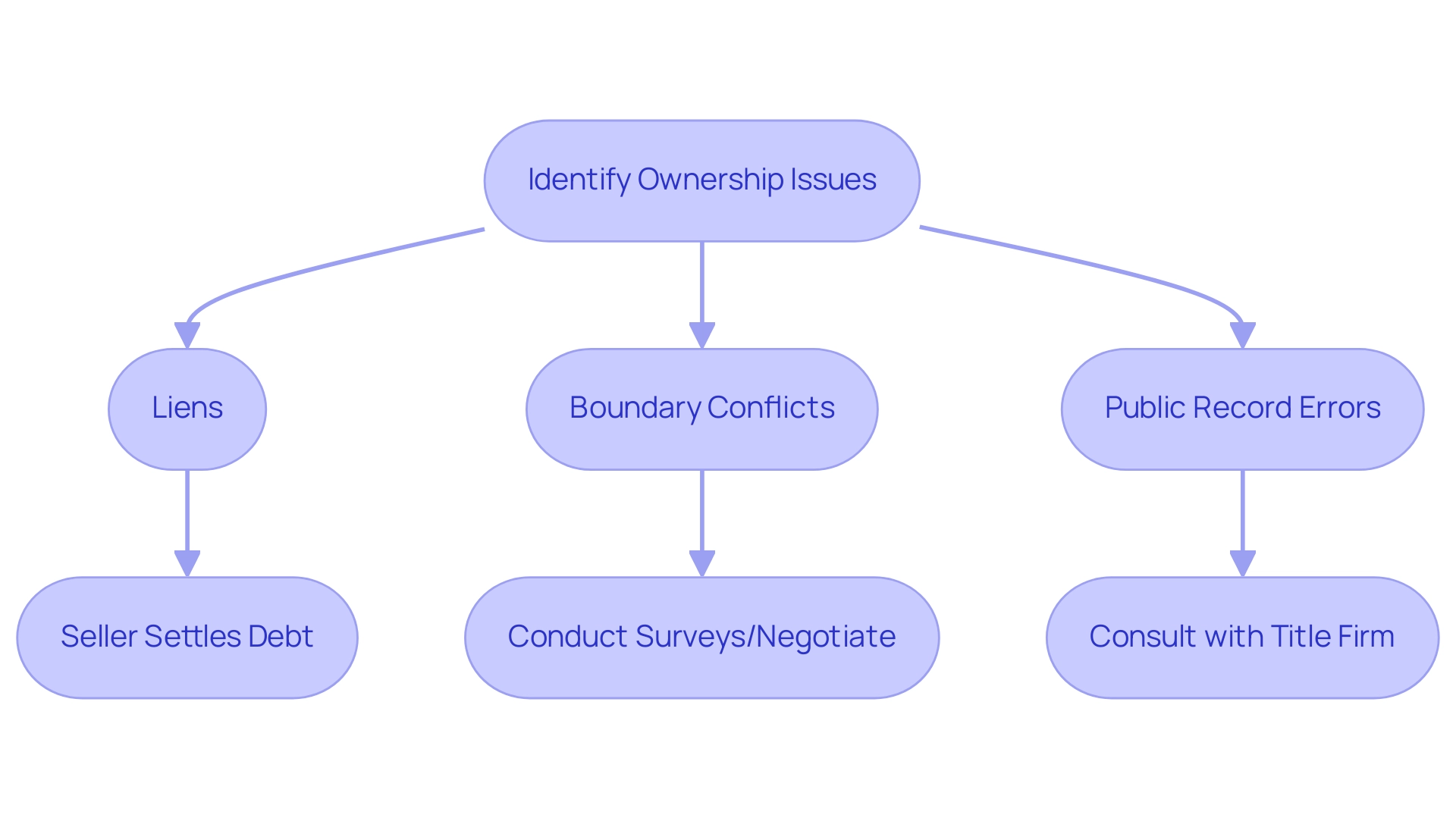
How to Verify a Clear Title: Steps for Real Estate Professionals
To effectively verify a clear title, real estate professionals must adhere to comprehensive steps that ensure the integrity of property transactions.
- Conduct a Title Search: Begin by examining public records to uncover any existing liens or claims against the asset. This initial step is crucial; a report or abstract can reveal defects that may hinder the use of a property with a free and clear title.
- Review the Chain of Title: Analyze historical ownership records to confirm that the seller possesses the legal authority to transfer ownership. This process ensures that all previous transactions are legitimate, affirming the existence of a free and clear title without unresolved issues.
- Obtain Ownership Insurance: Secure an ownership insurance policy to safeguard against unforeseen complications that may surface post-sale. This insurance is particularly important given recent legislative developments, such as the Protecting America’s Property Rights Act (H.R. 5837, S. 2687), which mandates insurance for mortgages backed by Fannie Mae and Freddie Mac.
- Consult with Experts: If discrepancies arise during the document search, it is advisable to consult with a company or legal expert. Their insights can clarify complex issues and provide guidance on how to proceed.
By diligently following these steps, real estate professionals can confidently affirm the authenticity of land ownership documents, which must include a free and clear title. This diligence safeguards purchasers and lenders from possible future claims. Furthermore, the integration of advanced technologies, such as AI in document searches, has streamlined this process, significantly reducing transaction costs and expediting closing timelines in the real estate industry. For instance, AI ownership search processes effectively trace ownership chains and identify unresolved issues, ensuring that a free and clear title is confirmed before real estate transactions are finalized.
As Armstrong noted, "What can be an annoying experience for a new owner in one state can be a very scary one in another," highlighting the varying experiences of ownership across different jurisdictions. This underscores the significance of comprehensive verification in protecting property transactions.
The Role of Title Insurance in Securing Clear Titles
Insurance for ownership is essential in guaranteeing a free and clear title, providing safeguarding to both purchasers and lenders against financial losses arising from ownership defects. This insurance protects against issues such as undiscovered liens, fraudulent claims, and errors in public records that may surface post-purchase. Indeed, buyers collectively invest roughly $22 billion each year on insurance for property, underscoring its significance in property transactions.
For real estate experts, obtaining insurance for property not only offers clients reassurance but also enhances their credibility in the market. By educating clients about the potential risks associated with ownership defects, professionals can illuminate the value of this insurance in safeguarding their investments. Notably, in 2023, 64% of insurance firms reported increased expenses related to curative work, emphasizing the importance of having a free and clear title to navigate the growing complexity and compliance burdens in the industry.
Furthermore, the need for further digitization of state and local records is crucial to improve efficiency and reduce costs in insurance, addressing some of these challenges.
Moreover, ownership insurance plays a vital role in ensuring a free and clear title, which helps mitigate financial losses during real estate transactions. It encompasses legal fees and other expenses incurred when addressing conflicts over ownership issues, which can otherwise lead to significant financial strain. As property values continue to rise, direct insurance premiums have also experienced a positive effect, reflecting the industry's growth potential.
The insurance sector generates revenue through various product and service lines, including:
- Direct insurance premiums
- Agency insurance premiums
- Search services
This indicates a diverse revenue segmentation.
In summary, the function of ownership insurance transcends simple protection; it is a critical element of the property transaction process that ensures a free and clear title for both purchasers and lenders, shielding them from unexpected challenges. As pointed out by the specialists at Ratified Title Group, "With the expertise of Ratified Title Group, you can be assured of a hassle-free real estate buying experience." With a significant percentage of purchasers opting for coverage, it is essential for property professionals to promote its importance in every deal.
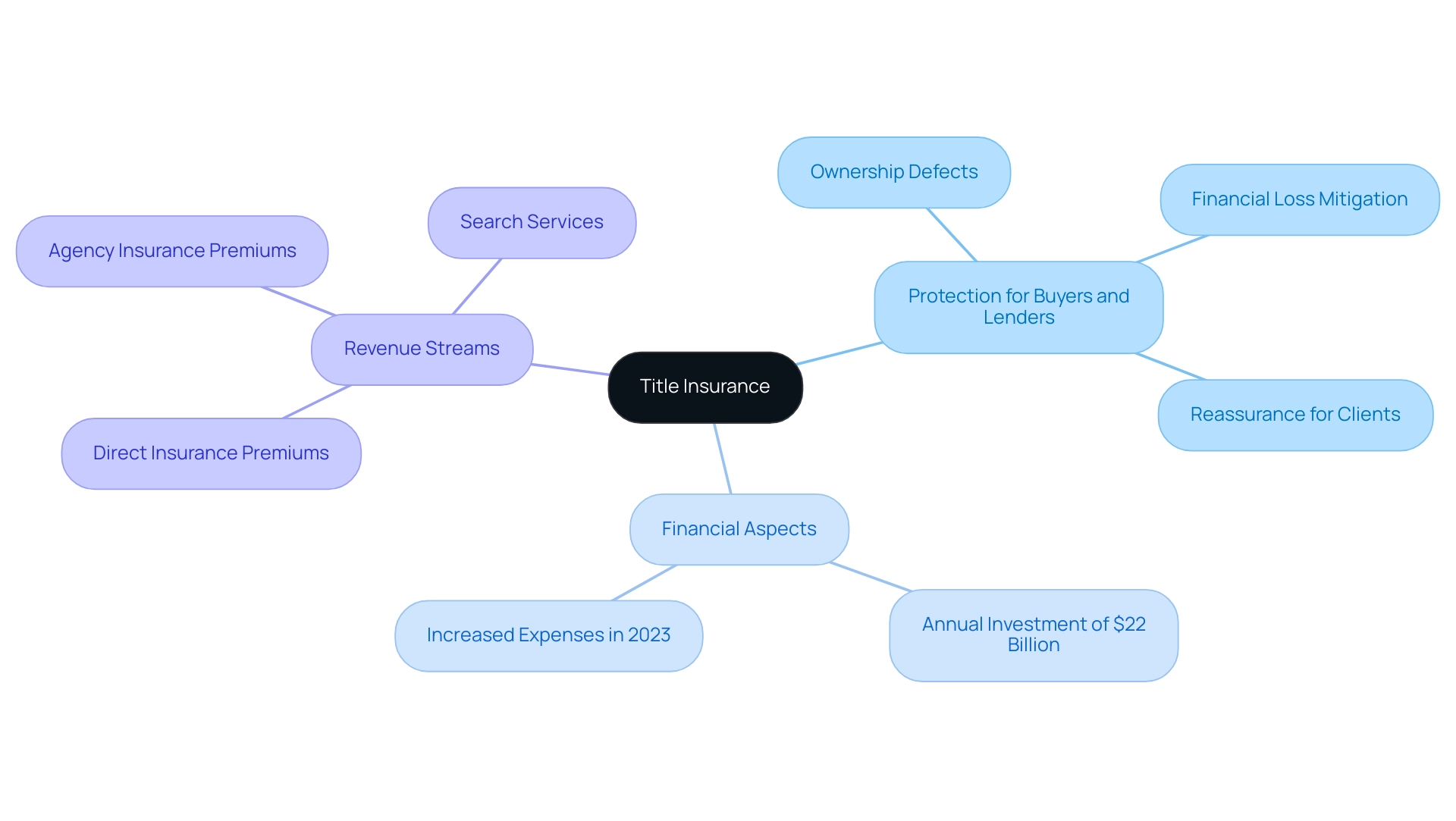
Best Practices for Maintaining Clear Titles in Real Estate
To ensure the integrity of real estate titles, real estate professionals should implement the following best practices:
- Conduct Regular Title Audits:
Regular audits are essential for identifying and correcting discrepancies in real estate records. This proactive approach can help ensure a free and clear title, preventing potential disputes and streamlining transactions. Statistics indicate that management decisions on audit findings must be issued within six months after receipt of the audit report, underscoring the importance of timely audits in ensuring a free and clear title. - Document All Transactions Thoroughly:
It is crucial to ensure that every property transaction is meticulously documented and recorded with the appropriate authorities. Proper documentation not only supports clarity of ownership but also ensures that the property has a free and clear title in compliance with legal requirements. As mentioned by the National Association of Realtors, an insurance firm may request information from real estate professionals to help maintain compliance with the Residential Real Estate GTOs, highlighting the significance of cooperation and communication. - Educate Clients on Liens and Claims:
Clear communication with clients regarding the significance of resolving any outstanding liens or claims before a sale is vital. This step helps mitigate risks related to ownership disputes and ensures that the transaction process results in a free and clear title. - Stay Updated on Legal Changes:
Real estate professionals must remain informed about evolving laws and regulations that could impact ownership. This knowledge enables them to navigate potential challenges effectively. Furthermore, improving law enforcement's capacity to recognize advantageous owners involved in residential property transactions is vital for maintaining a free and clear title and ensuring compliance. - Reference Case Studies:
Understanding state laws, such as those illustrated in the case study on Voluntary Cleanup Programs, can facilitate the redevelopment of contaminated sites and expedite approvals, which is relevant in discussions about ownership clarity and property transactions.
By adhering to these best practices, professionals can significantly contribute to ensuring a free and clear title, thereby reducing the likelihood of disputes and ensuring smoother property transactions. Additionally, statistics indicate that regular ownership audits can lead to a marked decrease in transaction delays, underscoring their importance in the real estate industry.
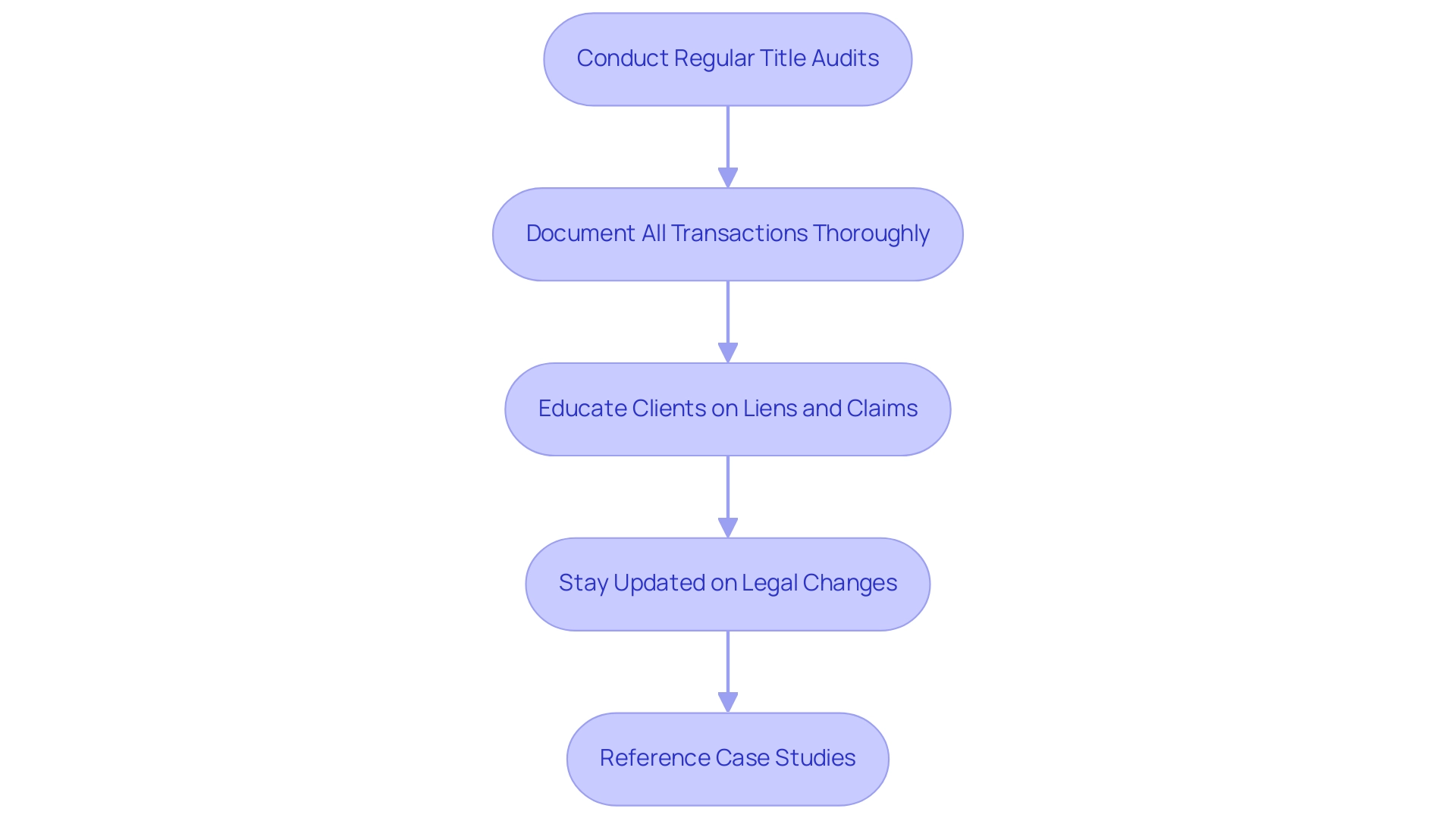
Leveraging Technology for Efficient Title Research and Verification
The integration of technology in research and verification is revolutionizing the industry by significantly boosting both efficiency and accuracy. Advanced tools such as machine learning and optical character recognition automate the extraction of critical information from extensive documents, drastically reducing the time spent on manual searches. For instance, platforms like Parse AI can quickly assess large volumes of data, identifying potential issues that may arise during the verification process.
Realty professionals increasingly acknowledge the benefits of these technological innovations. By leveraging machine learning, they enhance their workflows, leading to quicker turnaround times and improved accuracy in verifying free and clear titles. This not only streamlines operations but also elevates the quality of service provided to clients.
Current statistics underscore the growing adoption of technology in this field, with a notable increase in efficiency gains reported by users of machine learning tools. In 2024, there were 1.7 million vacant technology jobs globally, highlighting the demand for skilled professionals in this sector. Furthermore, a 2021 report from McKinsey revealed that for every 100 men elevated to managerial positions in the tech sector, only 52 women attain the same, illustrating persistent workforce dynamics that may impact technology adoption.
Additionally, a case study on students' perspectives regarding digital learning technology found that 70% of US students expressed satisfaction with their current levels of digital integration, suggesting similar contentment could be reflected in the property industry as professionals adopt technological innovations. As the real estate landscape continues to evolve, embracing these advancements will be crucial for professionals aiming to remain competitive and responsive to client needs.
Conclusion
A free and clear title is fundamental to successful real estate transactions, providing assurance that a property is free from liens and legal claims. This clarity not only protects the interests of buyers but also enhances the overall efficiency of the transaction process. As highlighted throughout the article, the distinction between clean and clear titles is critical for real estate professionals to understand, as it can significantly impact the success of property deals. The prevalence of title issues in transactions underscores the importance of thorough title searches and the role of technology in streamlining this process.
Furthermore, the integration of advanced tools like Parse AI is revolutionizing title verification, allowing for quicker and more accurate assessments of title status. This technological shift not only improves operational efficiency but also elevates the quality of service provided to clients, fostering greater confidence in real estate investments.
In conclusion, maintaining clear titles is an ongoing responsibility for real estate professionals. By adhering to best practices, leveraging technology, and educating clients about the significance of title insurance, they can mitigate risks associated with title defects. As the real estate landscape continues to evolve, prioritizing clear titles will remain essential for fostering trust and ensuring successful transactions in the industry.
Frequently Asked Questions
What does a free and clear title signify in real estate?
A free and clear title indicates that a real estate asset is free of any liens, encumbrances, or legal claims, allowing the owner to possess complete rights to the property without any outstanding debts or obligations.
Why is having a free and clear title important for property transactions?
Having a free and clear title is crucial as it enables smooth transactions, allowing buyers to invest confidently, knowing there are no hidden claims that could arise later.
What is the significance of home ownership rates related to clear ownership documents?
High home ownership rates, such as Nevada's 62.5%, highlight the importance of clear ownership documents in maintaining property value and facilitating sales.
How does understanding home equity relate to free and clear titles?
Understanding home equity is vital for homeowners since it affects potential sales proceeds and borrowing options. Free and clear title ownership contributes to a homeowner's equity and financial flexibility.
What role does document verification play in real estate transactions?
Verifying a document's status is essential before any sale or transfer of ownership, as it protects buyers' interests and increases the likelihood of successful transactions.
How do properties with unencumbered ownership affect transaction success?
Properties with unencumbered ownership typically experience smoother closings and fewer disputes, making them more attractive to potential buyers.
What tools can assist in verifying ownership status?
Advanced machine learning tools, such as those provided by Parse AI, help researchers efficiently extract critical information from documents, ensuring accurate verification of ownership status.
What are the implications of ownership issues in real estate transactions?
Approximately 25% of real estate transactions are affected by ownership issues, emphasizing the need for thorough ownership searches to avoid complications.
How can selling a property without representation impact financial outcomes?
Selling a $400,000 residence without representation could potentially result in a loss of $120,000 due to ownership problems, highlighting the importance of thorough ownership examinations.
What is the difference between a 'clean' and a 'clear' title?
A 'clean' title indicates that there are no legal concerns or disputes, while a 'clear' title specifically means there are no liens or encumbrances on the property, ensuring the owner has a free and clear title.
Why are ownership searches important in real estate?
Ownership searches trace the history of a property’s ownership to confirm the seller's legal right to sell and identify any issues like liens or unpaid mortgages, preventing costly surprises for buyers.
What complexities surround ownership issues in real estate?
Ownership issues can be complex, as an unblemished document may not guarantee a free and clear title, making it essential for real estate professionals to differentiate between the two to assist clients effectively.




